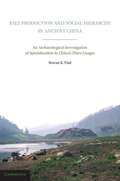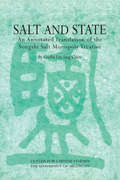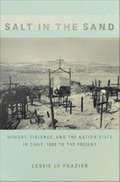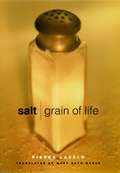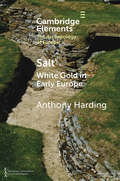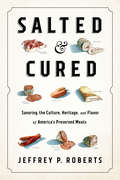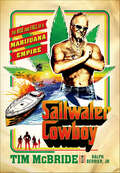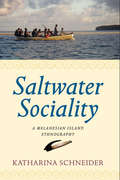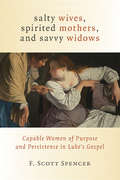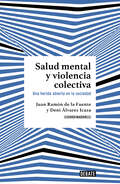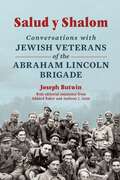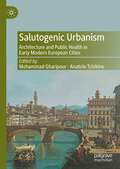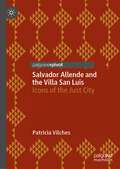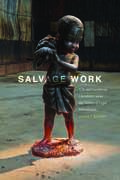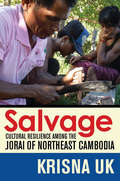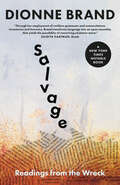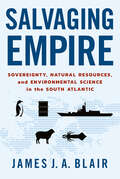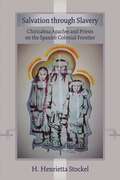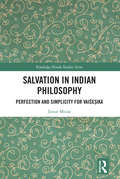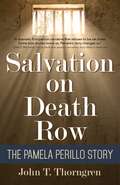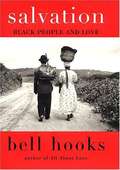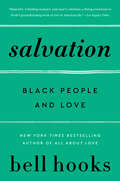- Table View
- List View
Salsa Dancing into the Social Sciences: Research in an Age of Info-glut
by Kristin Luker“You might think that dancing doesn’t have a lot to do with social research, and doing social research is probably why you picked this book up in the first place. But trust me. Salsa dancing is a practice as well as a metaphor for a kind of research that will make your life easier and better.” Savvy, witty, and sensible, this unique book is both a handbook for defining and completing a research project, and an astute introduction to the neglected history and changeable philosophy of modern social science. In this volume, Kristin Luker guides novice researchers in: knowing the difference between an area of interest and a research topic; defining the relevant parts of a potentially infinite research literature; mastering sampling, operationalization, and generalization; understanding which research methods best answer your questions; beating writer’s block. Most important, she shows how friendships, non-academic interests, and even salsa dancing can make for a better researcher. “You know about setting the kitchen timer and writing for only an hour, or only 15 minutes if you are feeling particularly anxious. I wrote a fairly large part of this book feeling exactly like that. If I can write an entire book 15 minutes at a time, so can you.”
Salt Production and Social Hierarchy in Ancient China
by Rowan K. FladThis book examines the organisation of specialised salt production at Zhongba, one of the most important prehistoric sites in the Three Gorges of China's Yangzi River valley. Rowan K. Flad demonstrates that salt production emerged in the second millennium BCE and developed into a large-scale, intense activity. As the intensity of this activity increased during the early Bronze Age, production became more coordinated, perhaps by an emergent elite who appear to have supported their position of authority by means of divination and the control of ritual knowledge. This study explores evidence of these changes in ceramics, the layout of space at the site and animal remains. It synthesises the data retrieved from years of excavation, showing not only the evolution of production methods, but also the emergence of social hierarchy in the Three Gorges region over two millennia.
Salt Wars: The Battle Over the Biggest Killer in the American Diet
by Michael F. JacobsonFrom the crusader credited with popularizing the phrase "junk food," Salt Wars uncovers the group of scientists who worked with food industry lobbyists and fought all efforts to reduce the dangerous levels of sodium in our food.A high-sodium diet is deadly; studies have linked it to high blood pressure, stroke, and heart attacks. It's been estimated that excess sodium in the American diet causes as many as 100,000 deaths per year. And yet salt is everywhere in our diets--in packaged food, fast food, and restaurant meals. Why hasn't salt received the sort of attention and regulatory action that sugar and fat have? In Salt Wars, Michael Jacobson explains how the American food industry have fought government efforts to reduce dangerous levels of sodium in our food.
Salt and State: An Annotated Translation of the Songshi Salt Monopoly Treatise (Michigan Monographs In Chinese Studies #99)
by Cecilia Lee-fang ChienSalt and State is an annotated translation of a treatise on salt from Song China. From its inception in the Han dynasty (206 B.C.–220 A.D.), the salt monopoly was a key component in the Chinese government's financial toolkit. Salt, with its highly localized and large-scale production, was an ideal target for bureaucratic management. In the Song dynasty (960–1279), fiscal pressures on the government had intensified with increased centralization and bureaucratization. A bloated administration and an enormous standing army maintained against incursions by aggressive steppe neighbors placed tremendous strain on Song finances. Developing the salt monopoly seemed a logical and indeed urgent strategy, but each actor in this plan—the emperor, local officials, monopoly administrators, producers, merchants, and consumers—had his own interests to protect and advance. Thus attempts to maximize the effectiveness of the monopoly meant frequent policy swings and led to levels of corruption that would ultimately undo the Song. Unlike other contemporary sources, the Songshi treatise organizes its subject into an intelligible and detailed narrative, elucidating special terminology, the bureaucracy and its processes, and debates relating to Chinese finance and politics, as well as the salt industry itself. Professor Chien's extensive annotation relies on parallel histories that corroborate and supplement the Songshi account, together providing a comprehensive study of this important institution in China's premodern political economy.
Salt in the Sand: Memory, Violence, and the Nation-State in Chile, 1890 to the Present
by Lessie Jo FrazierSalt in the Sand is a compelling historical ethnography of the interplay between memory and state violence in the formation of the Chilean nation-state. The historian and anthropologist Lessie Jo Frazier focuses on northern Chile, which figures prominently in the nation's history as a site of military glory during the period of national conquest, of labor strikes and massacres in the late nineteenth century and early twentieth, and of state detention and violence during World War II and the Cold War. It was also the site of a mass-grave excavation that galvanized the national human rights movement in 1990, during Chile's transition from dictatorship to democracy. Frazier analyzes the creation of official and alternative memories of specific instances of state violence in northern Chile from 1890 to the present, tracing how the form and content of those memories changed over time. In so doing, she shows how memory works to create political subjectivities mobilized for specific political projects within what she argues is the always-ongoing process of nation-state formation. Frazier's broad historical perspective on political culture challenges the conventional periodization of modern Chilean history, particularly the idea that the 1973 military coup marked a radical break with the past. Analyzing multiple memories of state violence, Frazier innovatively shapes social and cultural theory to interpret a range of sources, including local and national government archives, personal papers, popular literature and music, interviews, architectural and ceremonial commemorations, and her ethnographic observations of civic associations, women's and environmental groups, and human rights organizations. A masterful integration of extensive empirical research with sophisticated theoretical analysis, Salt in the Sand is a significant contribution to interdisciplinary scholarship on human rights, democratization, state formation, and national trauma and reconciliation.
Salt: Grain of Life (Arts and Traditions of the Table: Perspectives on Culinary History)
by Pierre LaszloFor the sake of salt, Rome created a system of remuneration (from which we get the word "salary"), nomads domesticated the camel, the Low Countries revolted against their Spanish oppressors, and Gandhi marched against the tyranny of the British. Through the ages, salt has conferred status, preserved foods, and mingled in the blood, sweat, and tears of humanity. Today, chefs of haute cuisine covet it in its most exotic forms—underground salt deposits, Hawaiian black lava salt, glittery African crystals, and pink Peruvian salt from the sea carried in bricks on the backs of llamas.From proverbs to technical arguments, from anecdotes to examples of folklore, chemist and philosopher Pierre Laszlo takes us through the kingdom of "white gold." With "enthusiasm and freshness" (Le Monde) he mixes literary analysis, history, anthropology, biology, physics, economics, art history, political science, chemistry, ethnology, and linguistics to create a full body of knowledge about the everyday substance that rocked the world and brings zest to the ordinary. Laszlo explains the history behind Morton Salt's slogan "When it rains, it pours!" and looks into the plight of the salt miner, as well as spectroscopy and nuclear magnetic resonance. Salt is a tour de force about a chemical compound that is one of the very foundations of civilization.
Salt: White Gold in Early Europe (Elements in the Archaeology of Europe)
by Anthony HardingThis Element provides a concise account of the archaeology of salt production in ancient Europe. It describes what salt is, where it is found, what it is used for, and its importance for human and animal health. The different periods of the past in which it was produced are described, from earliest times down to the medieval period. Attention is paid to the abundant literary sources that inform us about salt in the Greek and Roman world, as well as the likely locations of production in the Mediterranean and beyond. The economic and social importance of salt in human societies means that salt has served as a crucial aspect of trade and exchange over the centuries, and potentially as a means of individuals and societies achieving wealth and status.
Salted and Cured: Savoring the Culture, Heritage, and Flavor of America's Preserved Meats
by Jeffrey RobertsFrom country ham to coppa, bacon to bresaola Prosciutto. Andouille. Country ham. The extraordinary rise in popularity of cured meats in recent years often overlooks the fact that the ancient practice of meat preservation through the use of salt, time, and smoke began as a survival technique. All over the world, various cultures developed ways to extend the viability of the hunt—and later the harvest—according to their unique climates and environments, resulting in the astonishing diversity of preserved meats that we celebrate and enjoy today everywhere from corner delis to white-tablecloth restaurants. In Salted and Cured, author Jeffrey P. Roberts traces the origins of today’s American charcuterie, salumi, and other delights, and connects them to a current renaissance that begins to rival those of artisan cheese and craft beer. In doing so, Roberts highlights the incredible stories of immigrant butchers, breeders, chefs, entrepreneurs, and other craftspeople who withstood the modern era’s push for bland, industrial food to produce not only delicious but culturally significant cured meats. By rejecting the industry-led push for “the other white meat” and reinvigorating the breeding and production of heritage hog breeds while finding novel ways to utilize the entire animal—snout to tail—today’s charcutiers and salumieri not only produce everything from country ham to violino di capra but create more sustainable businesses for farmers and chefs. Weaving together agriculture, animal welfare and health, food safety and science, economics, history, a deep sense of place, and amazing preserved foods, Salted and Cured is a literary feast, a celebration of both innovation and time-honored knowledge, and an expertly guided tour of America’s culinary treasures, both old and new.
Saltwater Cowboy: The Rise and Fall of a Marijuana Empire
by Ralph Berrier Jr. Tim McBride“A wild and entertaining true story by one of the biggest pot haulers in American history . . . Tim McBride’s tale of excess is a thrill to read.” —Bruce Porter, New York Times–bestselling author of BlowIn 1979, Wisconsin native Tim McBride hopped into his Mustang and headed south. He was twenty-one, and his best friend had offered him a job working as a crab fisherman in Chokoloskee Island, a town of fewer than 500 people on Florida’s Gulf Coast. Easy of disposition and eager to experience life at its richest, McBride jumped in with both feet.But this wasn’t a typical fishing outfit. McBride had been unwittingly recruited into a band of smugglers—middlemen between a Colombian marijuana cartel and their distributors in Miami. His elaborate team comprised fishermen, drivers, stock houses, security—seemingly all of Chokoloskee Island was in on the operation. As McBride came to accept his new role, tons upon tons of marijuana would pass through his hands.Then the federal government intervened in 1984, leaving the crew without a boss and most of its key players. McBride, now a veteran smuggler, was somehow spared. So when the Colombians came looking for a new middle-man, they turned to him.McBride became the boss of an operation that was ultimately responsible for smuggling 30 million pounds of marijuana. A self-proclaimed “Saltwater Cowboy,” he would evade the Coast Guard for years, facing volatile Colombian drug lords and risking betrayal by romantic partners until his luck finally ran out.A tale of crime and excess, Saltwater Cowboy is the gripping memoir of one of the biggest pot smugglers in American history.
Saltwater Sociality
by Katharina SchneiderThe inhabitants of Pororan Island, a small group of 'saltwater people' in Papua New Guinea, are intensely interested in the movements of persons across the island and across the sea, both in their everyday lives as fishing people and on ritual occasions. From their observations of human movements, they take their cues about the current state of social relations. Based on detailed ethnography, this study engages current Melanesian anthropological theory and argues that movements are the Pororans' predominant mode of objectifying relations. Movements on Pororan Island are to its inhabitants what roads are to 'mainlanders' on the nearby larger island, and what material objects and images are to others elsewhere in Melanesia.
Salty Wives, Spirited Mothers, and Savvy Widows: Capable Women of Purpose and Persistence in Luke's Gospel
by F. Scott SpencerEngaging feminist hermeneutics and philosophy in addition to more traditional methods of biblical study, Salty Wives, Spirited Mothers, and Savvy Widows demonstrates and celebrates the remarkable capability and ingenuity of several women in the Gospel of Luke. While recent studies have exposed women's limited opportunities for ministry in Luke, Scott Spencer pulls the pendulum back from a negative feminist-critical pole toward a more constructive center. Granting that Luke sends somewhat "mixed messages" about women's work and status as Jesus' disciples, Spencer analyzes such women as Mary, Elizabeth, Joanna, Martha and Mary, and the infamous yet intriguing wife of Lot -- whom Jesus exhorts his followers to "remember" -- as well as the unrelentingly persistent women characters in Jesus' parables.
Salud mental y violencia colectiva: Una herida abierta en la sociedad
by de la Álvarez Icaza, DeníNo puede haber salud mental donde existe tanto dolor. La violencia deja heridas por donde quiera que pasa: en el cuerpo de las personas, por supuesto, pero también en su psique, en su modo de relacionarse con el mundo y, por lo tanto, en sus comunidades. Este libro, revolucionario en su enfoque, explica con el mayor de los rigores las huellas que las violencias colectivas de los últimos años han dejado en México y en los mexicanos. Los 15 investigadores reunidos en esta obra analizan -desde la psicología, la sociología, la psiquiatría y la antropología- el trauma colectivo que se ha generado, el fenómeno de la normalización y el discurso que la alimenta, la violencia desatada contra las mujeres, los efectos del reclutamiento forzado, la trata y la impunidad; el papel que desempeña la migración o la pobreza, las consecuencias reflejadas en el consumo de alcohol y drogas, la debilidad institucional y la fractura de las familias... Sin embargo, tras el diagnóstico viene el tratamiento. La obra concluye, así, proponiendo algunas de las vías que podemos transitar para erguirnos ante la deshumanización que enfrentamos y recuperar nuestro equilibro, como individuos y como nación.
Salud y Shalom: Conversations with Jewish Veterans of the Abraham Lincoln Brigade
by Joseph ButwinJewish volunteers made up almost one-third of the Abraham Lincoln Brigade (ALB) during the Spanish Civil War. Most belonged to a Communist Party focused on the antifascist goals of the Popular Front and faithful to the internationalist idea of erasing ethnicity, including Jewish ethnicity. Joseph Butwin’s oral history presents conversations with ten Jewish veterans of the ALB. Recorded from 1992–94 in the wake of European communism’s collapse, the interviews explore the milieus that formed the volunteers. Immigrants established the secular Yiddish-speaking socialism that became a part of many Jewish American communities. Their children, reacting to economic depression and the rise of fascism, enlisted in the ALB. Butwin follows their stories from their youthful motives and choices through their lives as Jews and leftists, and records the reckonings that took place as they reflected on their past. Insightful and revealing, Salud y Shalom explores the forces of identity and history that led young Jewish leftists to fight fascism.
Salutogenic Urbanism: Architecture and Public Health in Early Modern European Cities
by Mohammad Gharipour Anatole TchikineThis book offers a new, salutogenic, perspective on the development of early modern cities by exploring profound and complex ways in which architecture and landscape design served to promote public health on an urban scale. Focusing on fifteenth- through nineteenth-century Europe, it addresses the histories of spaces and institutions that supported salubrious living, highlighting the intersections of medical theory, government policy, and architectural practice in designing, improving, and monumentalizing the infrastructure of sanitation and healthcare. Studies in this book highlight the joint role of design thinking and scientific practice in reforming the facilities for treating and preventing disease; the impact of cross-cultural exchange on early modern strategies of urban improvement; and the creation of new therapeutic environments through state, communal, and private initiatives concerned with the preservation of physical and mental health, from recreational landscapes to spa resorts.
Salvador Allende and the Villa San Luis: Icons of the Just City
by Patricia VilchesThrough the history of this housing complex, this book illuminates Salvador Allende’s dedication to the imperative of the right to the city for Chile’s marginalized people. Built in affluent Las Condes in Santiago, on what is arguably the most expensive parcel of land in Chile, the Villa San Luis was one of Salvador Allende’s most visible and dramatic social projects. Allende’s six-year term was ended in the middle by a military coup d’état on 11th September 1973. Yet, material culture from Villa San Luis remains to convey the legacy of his commitment to providing disadvantaged families with dignified housing. It is a national lieu de mémoire and an iconic space, a reminder of a truly remarkable innovation in social housing and of Allende’s personal and political commitment to making Santiago a just city. Postcoup, the remains of the complex also relate the wider injustice of the Pinochet regime. Many of its families were violently evicted during the dictatorship. Some were dispossessed, taken away from Las Condes in garbage trucks, and dumped in poor communities around Santiago. The land was usurped by Pinochet on behalf of the army and later sold to developers to construct high-rise symbols of a new, neoliberal Chile. Over the decades, however, former residents fought back and, in 2020, they succeeded in making its one remaining structure, remnants of Block 14, a memorialized place of justice and reconciliation. It now a national monument and museum.
Salvage Work: U.S. and Caribbean Literatures amid the Debris of Legal Personhood
by Angela NaimouSalvage Work examines contemporary literary responses to the law’s construction of personhood in the Americas. Tracking the extraordinary afterlives of the legal slave personality from the nineteenth century into the twenty-first, Angela Naimou shows the legal slave to be a fractured but generative figure for contemporary legal personhood across categories of race, citizenship, gender, and labor. What emerges is a compelling and original study of how law invents categories of identification and how literature contends with the person as a legal fiction. Through readings of Francisco Goldman’s The Ordinary Seaman, Edwidge Danticat’s Krik?Krak!, Rosario Ferre’s Sweet Diamond Dust (Maldito Amor), Gayl Jones’s Song for Anninho and Mosquito, and John Edgar Wideman’s Fanon, Naimou shows how literary engagements with legal personhood reconfigure formal narrative conventions in Black Atlantic historiography, the immigrant novel, the anticolonial romance, the trope of the talking book, and the bildungsroman.Revealing links between colonial, civic, slave, labor, immigration, and penal law, Salvage Work reframes debates over civil and human rights by revealing the shared hemispheric histories and effects of legal personhood across seemingly disparate identities—including the human and the corporate person, the political refugee and the economic migrant, and the stateless person and the citizen.In depicting the material remains of the legal slave personality in the de-industrialized neoliberal era, these literary texts develop a salvage aesthetic that invites us to rethink our political and aesthetic imagination of personhood. Questioning liberal frameworks for civil and human rights as well as what Naimou calls death-bound theories of personhood—in which forms of human life are primarily described as wasted, disposable, bare, or dead in law—Salvage Work thus responds to critical discussions of biopolitics and neoliberal globalization by exploring the potential for contemporary literature to reclaim the individual from the legal regimes that have marked her.
Salvage: Cultural Resilience Among the Jorai of Northeast Cambodia
by Krisna UkIn Salvage, Krisna Uk draws on extensive research in a Cambodian village she calls Leu to provide a unique ethnography of the Jorai, an ethnic minority group that lives in Vietnam and in the most heavily bombed region of northeast Cambodia. The Jorai inhabit a remote region largely beyond the reach of the nation-state but have suffered the devastating effects of battles between and within states. Uk focuses on the experience of a Jorai community that experienced violent and protracted international and domestic conflicts--the Vietnam War and the Khmer Rouge regime. These conflicts had enduring effects on the community's moral fabric, the villagers' activities, and the physical and spiritual environments with which they engage daily.Uk's ethnography is an exploration of a resilient communal life that refuses to surrender its integrity to the blind, destructive forces of modern aerial warfare and that struggles to come to terms with the unintelligible violence unleashed by Cambodia's revolutionary movement. It examines the destructive power and enduring harm that explosive remnants of war inflict on the human body and the social relations. But it also reveals how the local Jorai villagers turn these treacherous and fatal products of foreign technology into precious subsistence items as well as aesthetic and ritualistic objects that will take the souls of the dead on their journey to a better life. Uk demonstrates how the Jorai of Leu can, through their creative and traditional labor, revive the legend of the formidable Jorai warriors by transforming deadly modern weapons into their own war trophies.
Salvage: Readings from the Wreck
by Dionne BrandIn her first full-length non-fiction since the influential A Map to the Door of No Return, Dionne Brand explores 17th, 18th and 19th-century English and American literature—and the colonial aesthetic that shaped her sense of self and world, of what was possible and what was not."Coloniality constructs outsides and insides—worlds to be chosen, disturbed, interpreted, and navigated—in order to live something like a real self."In Salvage, internationally acclaimed poet and novelist Dionne Brand offers a bracing account of reading, life and what remains in the wreck of empire. Uniquely and powerfully blending criticism and autobiography-as-artifact, Brand explores her encounters with colonial, imperialist and racist tropes in famous and familiar books, looking particularly at the extraordinary implications and modern-day reverberations of stories such as Defoe's Robinson Crusoe and Austen's Mansfield Park; the ways that the practices of reading and writing are shaped by those narrative structures; and the challenges of writing a narrative of Black life that attends to its own consciousness and expression. Making and remaking the self in relation to these dominant cultural narratives, Brand learned to read the literature of two empires, the British and the American, in an anti-colonial light—in order to survive, in order to live.The scene is the act of reading; the book, another kind of forensics—a forensics of the literary substance of which the author is made and from which she must recover. Or, if not recover, then piece together as artifact. Much more than autobiography, and much more than a work of literary criticism, Salvage is gripping, witty, revelatory and essential reading by one of our most powerful and brilliant writers.
Salvaging Empire: Sovereignty, Natural Resources, and Environmental Science in the South Atlantic
by James J. BlairSalvaging Empire probes the historical roots and current predicaments of a twenty-first century settler colony seeking to control an uncertain future through resource management and environmental science. Four decades after a violent 1982 war between the United Kingdom and Argentina reestablished British authority over the Falkland Islands (Las Malvinas in Spanish), a commercial fishing boom and offshore oil discoveries have intensified the sovereignty dispute over the South Atlantic archipelago. Scholarly literature on the South Atlantic focuses primarily on military history of the 1982 conflict. However, contested claims over natural resources have now made this disputed territory a critical site for examining the wider relationship between imperial sovereignty and environmental governance. James J. A. Blair argues that by claiming self-determination and consenting to British sovereignty, the Falkland Islanders have crafted a settler colonial protectorate to extract resources and extend empire in the South Atlantic. Responding to current debates in environmental anthropology, critical geography, Atlantic history, political ecology, and science and technology studies, Blair describes how settlers have asserted indigeneity in dynamic relation with the environment. Salvaging Empire uncovers the South Atlantic's outsized importance for understanding the broader implications of resource management and environmental science for the geopolitics of empire.
Salvation Through Slavery: Chiricahua Apaches and Priests on the Spanish Colonial Frontier
by H. Henrietta StockelIn her latest work, H. Henrietta Stockel examines the collision of the ethnocentric Spanish missionaries and the Chiricahua Apaches, including the resulting identity theft through Christian baptism, and the even more destructive creation of a local slave trade. The new information provided in this study offers a sample of the total unknown number of baptized Chiricahua men, women, and children who were sold into slavery by Jesuits and Franciscans. Stockel provides the identity of the priests as well as the names of the purchasers, often identified as Godfather. Stockel also explores Jesuit and Franciscan attempts to maintain their missions on New Spain's northern frontier during the seventeenth and eighteenth centuries. She focuses on how international political and economic forces shaped the determination of the priests to mold the Apaches into Christians and tax-paying citizens of the Empire. Diseases, warfare, interpersonal relations, and an overwhelming number of surrendered Chiricahuas at the missions, along with reduced supplies from Mexico City, forced the missionaries to use every means to continue their efforts at conversion, including deporting the Apaches to Cuba and selling others to Christian families on the colonial frontier.
Salvation in Indian Philosophy: Perfection and Simplicity for Vaiśeṣika (Routledge Hindu Studies Series)
by Ionut MoiseThis book offers a comprehensive description of the ‘doctrine of salvation’ (niḥśreyasa/ mokṣa) and Vaiśeṣika, one of the oldest philosophical systems of Indian philosophy and provides an overview of theories in other related Indian philosophical systems and classical doctrines of salvation. The book examines liberation, the fourth goal of life and arguably one of the most important topics in Indian philosophy, from a comparative philosophical perspective. Contextualising classical Greek Philosophy which contains the three goals of life (Aristotle’s Ethics), and explains salvation as first understood in the theology of the Hellenistic and Patristics periods, the author analyses six classical philosophical schools of Indian philosophy in which there is a marked emphasis on the ultimate ontological elements of the world and ‘self’. Analysing Vaiśeṣika and the manner in which this lesser known system has put forward its own theory of salvation (niḥśreyasa), the author demonstrates its significance and originality as an old and influential philosophical system. He argues that it is essential for the study of other Indian sciences and for the study of all comparative philosophy. An extensive introduction to Indian soteriology, this book will be an important reference work for academics interested in comparative religion and philosophy, Indian philosophy, Asian religion and South Asian Studies.
Salvation on Death Row: The Pamela Perillo Story
by John T. Thorngren"Some true stories move us. Pamela's story changes us." - Dale S.Recinella, Chaplain for Florida's Death Row and author of Now I Walk on Death RowPamela Perillo was set to die on March 24, 1996.Convicted of capital murder in 1980, Pamela sat on Texas’s Death Row awaiting lethal injection. But less than two days before her scheduled execution, she was given a second chance, and in 2000, she was resentenced: from death to life in prison with the possibility of parole.Her first chance at new life had come shortly after her arrest, when Pamela embraced the Christian faith and began bringing her fellow inmates to redemption in Christ.That’s why although Pamela’s story is one of imprisonment—first by abuse and addiction and ultimately behind the locked doors of the criminal justice system—it’s also a story of hope—of finding a new path in faith, of taking courage from the promise of salvation, and now, of praying for parole in 2019 after nearly forty years of incarceration.Salvation on Death Row combines true-crime reporting with a powerful spiritual memoir, reminding us that every life is a journey, every person is capable of change, and every individual can make a positive impact on the world."This is a great story with a wonderful conclusion: The only good answer is the Lord!"- -Bill Glass, founder of Bill Glass MinistriesThe author's proceeds from Salvation on Death Row will benefit Patriot PAWS service dogs.
Salvation on the Small Screen?: 24 Hours of Christian Television
by Nadia Bolz-WeberFrom a seminarian and stand-up comic—an “enlightening and entertaining” look at celebrity televangelists, cash, and couch-potato redemption (AJ Jacobs, author of The Year of Living Biblically). On an average day, the largest religious broadcast channel is a “divine” presence in more than 50 million households. Holding court on the political issues of the day are such figures as Joel Osteen, T.D. Jakes, Pat Robertson, Benny Hinn, and Jesse Duplantis. Yet many people have little concept of what kind of faith happens there—apart from performing miracles and selling books. A casual viewer flipping past the channel is likely to think, “I haven’t the faintest clue what’s going on,” or “That church doesn’t seem like my church at all,” or even, “Wow, so that’s what happened to Kirk Cameron.” To better understand the message of religious television, Lutheran seminarian Nadia Bolz-Weber spent 24 hours immersing herself in the phenomenon with guest viewers including a rabbi, a Unitarian minister, and her eight-year-old daughter. Augmented by a running count of all of the biblical verses used and total cost of various donations solicited and products shilled through the day, the author chronicles this hugely influential part of America’s religious landscape that is unfamiliar to many. And she never changed channels once. The result is “laugh-out-loud, hysterically funny, and also extraordinarily poignant—we need more theology done like this.” (Dr. Douglas Gay, Lecturer in Practical Theology, University of Glasgow, Scotland). “Turn off your TV and read this book. It's enlightening and entertaining and it doesn't emit any radiation whatsoever.” —AJ Jacobs, author of The Year of Living Biblically
Salvation: Black People and Love
by Bell HooksAcclaimed visionary and intellectual, Bell Hooks began her exploration of the meaning of love in American culture with the bestselling "All About Love: New Visions". Here she continues her love song to the nation with the groundbreaking and soul-stirring "Salvation: Black People and Love". Intimate and revolutionary, "Salvation" is a gift as provocative as it is healing. Written from a historical and cultural perspective, "Salvation" takes an incisive look at the transformative power of love in the lives of African-Americans. Whether talking about the legacy of slavery, relationships, and marriage in black life, the prose and poetry of Martin Luther King Jr., James Baldwin, Malcolm X, and Maya Angelou, the liberation movements of the 1950s, '60s, and '70s, sexual pain or pleasure, hip-hop and gangsta rap culture, addiction, greed, or the failure of black leadership, Hooks lets us know what love's got to do with it. Combining the passionate politics of W E. B. DuBois with fresh, contemporary insights, Hooks brilliantly offers new visions that will heal our nation's wounds from a culture of lovelessness.
Salvation: Black People and Love
by bell hooks“A manual for fixing our culture…In writing that is elegant and penetratingly simple, [hooks] gives voice to some things we may know in our hearts but need an interpreter like her to process.”—Black Issues Book ReviewNew York Times bestselling author, acclaimed visionary and cultural critic bell hooks continues her exploration of the meaning of love in contemporary American society, offering groundbreaking, critical insight about Black people and love.Written from both historical and cultural perspectives, Salvation takes an incisive look at the transformative power of love in the lives of African Americans. Whether talking about the legacy of slavery, relationships and marriage in Black life, the prose and poetry of Martin Luther King, Jr., James Baldwin, and Maya Angelou, the liberation movements of the 1950s, 60s, and 70s, or hip hop and gangsta rap culture, hooks lets us know what love’s got to do with it.Combining the passionate politics of W.E.B. DuBois with fresh, contemporary insights, hooks brilliantly offers new visions that will heal our nation’s wounds from a culture of lovelessness. Her writings on love and its impact on race, class, family, history, and popular culture will help us heal and create beloved American communities.

